Most motion pictures have back stories within them. The Boat Builder has one that goes back decades before the film was even conceptualized, back to when I was writing and directing television commercials and documentaries used in political campaigns. During those years, I learned how to tell a fully developed story that engages and captivates audiences in just thirty- or sixty-second segments. I also learned how to make the most out of smaller budgets. This skillset, along with my experience with long-form narrative as an author, helped lay the foundation for my later transition into independent filmmaking.
Starting my journey as an indie filmmaker later in life is the culmination of lessons learned from my life experiences and a long career in various creative fields.
After my first venture into long-form storytelling directing Freeze! An American Peace Story, a ninety-minute documentary on nuclear disarmament, which featured performances by John Denver, Judy Collins, and Jimmy Buffett, I came across the idea for The Boat Builder.
The genesis of the project began when a story came to me based on the plight of two people I knew in real life. One was an elderly and embittered man, the other a young orphan who was facing consignment to an institution after a series of failed foster home situations. In spite of the years that separated them, the two had more in common than they themselves, or those who knew them, might have realized. It was that commonality that led me to develop a story about two people at opposite ends of life who find a bond in a shared dream. A sailor since childhood, it occurred to me to make the dream of building a boat together a venture that could offer the hope of a metaphorical journey to freedom.
I first wrote the story as a play and, after staged readings, realized that film offered a less limiting and more dimensional form. Thus began the making of a film about the building of a dream, The Boat Builder.
And much in the way a boat is built, from the keel up, in the filming of The Boat Builder, a key element was the unfolding of a character-driven story layer by layer, from the basic premise to the conclusion. The two principal characters, gradually form a bond while working together.
To achieve that end, it was necessary for both leads to evolve into personas that were changed by the events they faced and by each other. That required more than performance alone. Cinematography, sound, effects, music, and color correction were all brought into play. They worked together to ever so gradually create the evolution of change, to transform what was at first cool and dark to warm and bright as hope replaced despair and the story journeyed to completion.



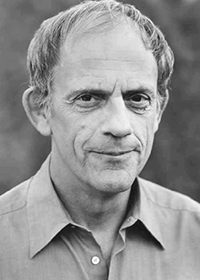 Christopher Lloyd began his career in theatre. He has appeared in over two hundred plays including on and off Broadway, regional and summer stock productions. For his title role in Kaspar he took home an Obie and Drama Desk award. Christopher starred in the Tony Award winning Broadway production of Mornings at Seven, directed by Dan Sullivan, as well as Twelfth Night in NY Festival’s Shakespeare in the Park and Center Stage’s Waiting for Godot, and as Dalton Trumbo in the New York production of Trumbo.
Christopher Lloyd began his career in theatre. He has appeared in over two hundred plays including on and off Broadway, regional and summer stock productions. For his title role in Kaspar he took home an Obie and Drama Desk award. Christopher starred in the Tony Award winning Broadway production of Mornings at Seven, directed by Dan Sullivan, as well as Twelfth Night in NY Festival’s Shakespeare in the Park and Center Stage’s Waiting for Godot, and as Dalton Trumbo in the New York production of Trumbo.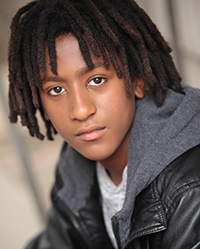 Prior to his role in The Boat Builder, alongside Christopher Lloyd, Tekola Cornetet, 12 years old, hosted a web series titled Tekola Takes Off, where he traveled across the globe, and off the beaten path, to experience and share cultures foreign to most Americans. Tekola is a long way from home - born in in rural Ethiopia and orphaned at the age of three, he was adopted by American parents when he was four. While working on his acting career, Tekola splits his time between his home in Denver, Colorado and Los Angeles.
Prior to his role in The Boat Builder, alongside Christopher Lloyd, Tekola Cornetet, 12 years old, hosted a web series titled Tekola Takes Off, where he traveled across the globe, and off the beaten path, to experience and share cultures foreign to most Americans. Tekola is a long way from home - born in in rural Ethiopia and orphaned at the age of three, he was adopted by American parents when he was four. While working on his acting career, Tekola splits his time between his home in Denver, Colorado and Los Angeles. 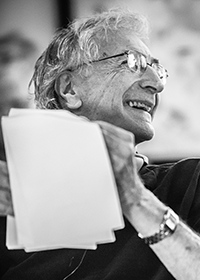 Arnold Grossman, writer and director of The Boat Builder began his career in advertising where his early work in television earned him numerous recognitions including the prestigious CLIO award. After creating T.V. commercials for a number of high profile political figures, including congressional representatives and presidential candidates, Grossman began focusing on his writing career publishing both narrative and nonfiction works.
Arnold Grossman, writer and director of The Boat Builder began his career in advertising where his early work in television earned him numerous recognitions including the prestigious CLIO award. After creating T.V. commercials for a number of high profile political figures, including congressional representatives and presidential candidates, Grossman began focusing on his writing career publishing both narrative and nonfiction works.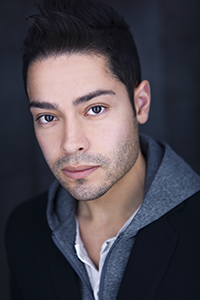 Richard J. Bosner produced the politically-charged true story Fruitvale Station starring Octavia Spencer and Michael B. Jordan which received the Sundance Film Festival U.S. Grand Jury Prize in the Dramatic category and the Sundance Audience Award, U.S. Dramatic, presented by Acura along with 44 nominations/wins during the 2013 Awards Season.
Richard J. Bosner produced the politically-charged true story Fruitvale Station starring Octavia Spencer and Michael B. Jordan which received the Sundance Film Festival U.S. Grand Jury Prize in the Dramatic category and the Sundance Audience Award, U.S. Dramatic, presented by Acura along with 44 nominations/wins during the 2013 Awards Season.-3.jpg)
-4.jpg)
-5.jpg)
-6.jpg)




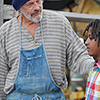

-12.jpg)
-13.jpg)
-14.jpg)